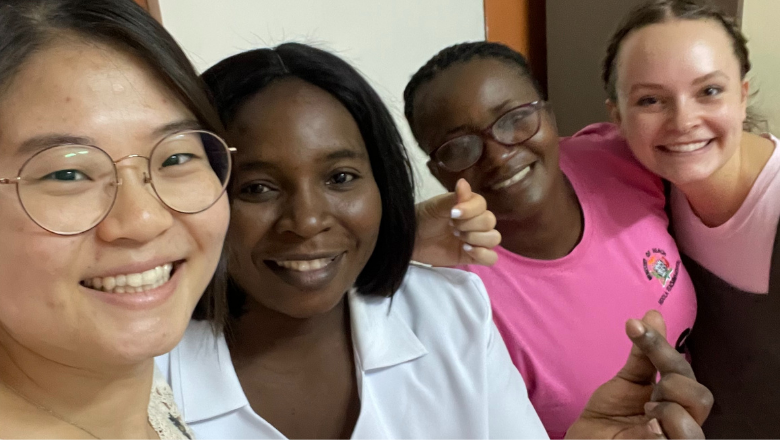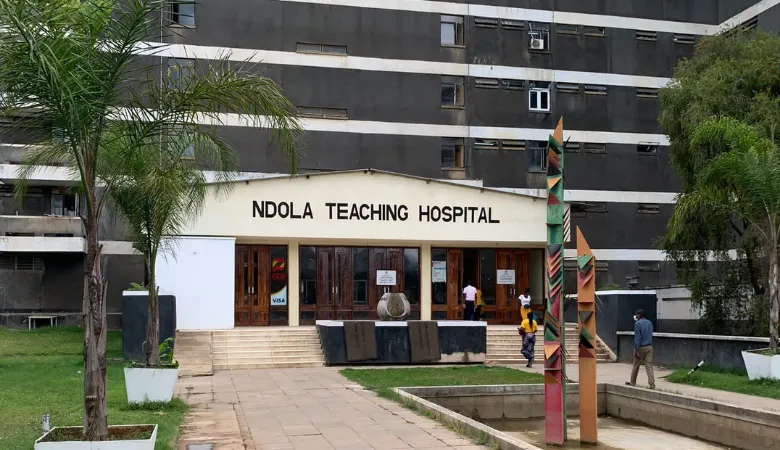“My research was a quantitative facility assessment of the available breast and cervical cancer services at Ndola Teaching Hospital (NTH). I found that NTH does not provide comprehensive breast and cervical cancer services due to gaps in human resources and infrastructure. There is no chemotherapy or radiotherapy, and only certain surgical procedures are available. There are no oncology specialists and major medical equipment, including mammograms and immunohistochemistry machines are not available to provide those services.”
Sang Hee Cho, Global Health with Global Surgery MSc
18 October 2023
King's students work with the Zambian government to develop breast and cervical cancer services
Global Health MSc students undertook their dissertation research to evaluate cancer services in Ndola, Zambia as part of the government’s plans to decentralise cancer services.

Masters students, Moira Hegyi and Sang Hee Cho spent one month working with Zambian healthcare partners to research the available breast and cervical cancer services at Ndola Teaching Hospital, and to identify possible gaps and areas for improvement.
The research is part of a wider collaboration between the Ministry of Health in Zambia, King’s Global Health Partnerships, the King’s Institute of Cancer Policy, Cancer Disease Hospital in Lusaka and Ndola Teaching Hospital, to support the government in their plans to decentralise cancer services from the capital, Lusaka and develop regional, comprehensive cancer centres in Ndola and Livingstone.
Through qualitative and quantitative mixed methods approaches, including interviews with healthcare professionals, field notes and the development of a facility assessment tool, Moira and Sang Hee presented the findings in their final dissertation papers.
This research will inform the Ministry of Health and key stakeholders at a policy workshop in early 2024, as they progress plans to decentralise cancer services.

Moira's research project was qualitative and looked at the perspectives of healthcare professionals on the barriers and facilitators to improving delivery of breast and cervical cancer services at NTH.
The first finding was that treatment delays are created by workforce and resource shortages. The second theme that emerged was around motivating and demoralising factors within a strained health workforce. And the third finding was around actualising the decentralisation policy - many healthcare professionals were unsure that the decentralisation policy would become a reality, but felt hopeful that the current administration was going to implement the plans, as progress has been made in constructing the new cancer services at the hospital."
Moira Hegyi, Global Health with Global Surgery MSc
Each year, students on the MSc in Global Health are given the opportunity to carry out their dissertation research on key projects being delivered by King’s Global Health Partnerships.
On the MSc course, we talk about the theory of how politics, the economy and culture affects healthcare services. Talking to healthcare workers who experience it first-hand, you see perspectives that you’ve never thought of before, or read in class, and that enriches your knowledge. It helped solidify what we’d learned on the course. It felt a big responsibility to be part of something so important. We're really grateful we got the opportunity and hope we did it justice.”
Sang Hee Cho and Moira Hegyi
As Programme Director of the MSc in Global Health and the Director of the King’s Global Health Partnerships, I am passionate about creating opportunities for our students to undertake dissertation research with our partners in Africa. Student projects are nested within our health system strengthening programs and students work collaboratively with clinical trainees and under the joint supervision of academics at King's and within our partner universities. Moira and Sang Hee rose to the challenge in Zambia and undertook high quality projects – with the research findings informing discussions at an upcoming cancer workshop in Zambia."
Professor Andrew Leather, Programme Director of the MSc in Global Health and Director of King's Global Health Partnerships
